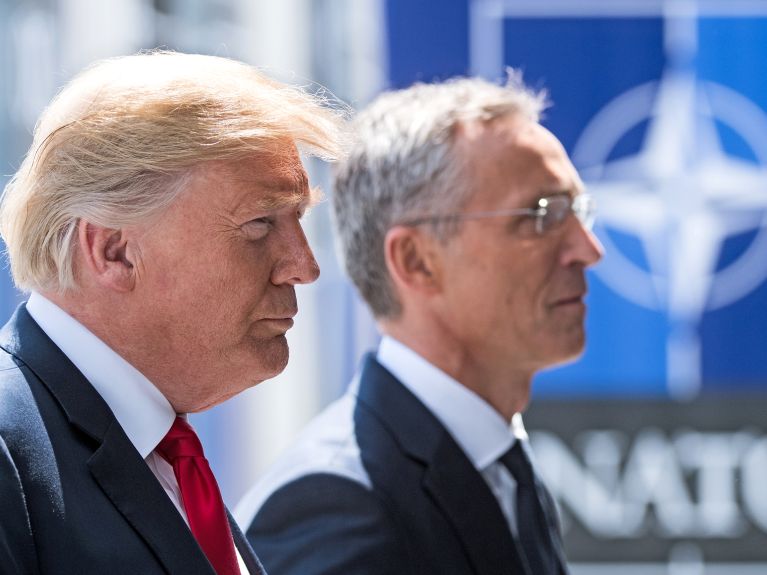Trump's NATO roller coaster: Now he's mad at Germany again
Earlier in the day, he'd put on a smile while addressing reporters with Angela Merkel.

Wednesday was a back-and-forth day in Brussels for US President Donald Trump, who was in town to eventually discuss NATO business with delegates from the trans-Atlantic alliance's 28 other member countries. First he was mad at Germany, claiming that the country was "captive" to Russia for its concessions in pursuit of a controversial gas pipeline deal. Then, after a public rebuke from Angela Merkel and a sit-down session with the chancellor, the US president was singing a revised tune, saying the bond between the increasingly uneasy allies was bigger — more "tremendous" even — than any differences between the leaders.
"We are having a great meeting," Trump told reporters following his one-on-one with the chancellor. "We are discussing military expenditure, and we are talking about trade. We have a very, very good relationship."
Merkel was more reserved with her assessment, saying the United States and Germany are "good partners, and we wish to continue cooperating in the future."
Once the chancellor was out of earshot, however, and the president was back on the Twitter, he seemed to have once more reappraised the situation, and Germany was in the wrong again. "What good is NATO if Germany is paying Russia billions of dollars for gas and energy?" Trump asked rhetorically. "Why are there only 5 out of 29 countries that have met their commitment? The US is paying for Europe's protection, then loses billions on trade. Must pay 2 percent of GDP immediately, not by 2025."
In more official business at the summit on Wednesday, the alliance invited Macedonia to begin accession talks, after the Balkan nation resolved a long-running dispute with neighboring Greece, a NATO member that has a state with a similar name. Officials in Athens had successfully unilaterally blocked Macedonia's candidacy for a decade. The new formal name for what the UN and EU officially label the Former Yugoslav Republic of Macedonia (FYROM) still requires domestic political approval.
'Germany is captive'
The dispute between Trump and Merkel started, as it often does with this US president, with an utterance.
"Germany is captive of Russia because it is getting so much of its energy from Russia," Trump said, referring to Berlin's Nord Stream 2 deal with Moscow. "They pay billions of dollars to Russia, and we have to defend them against Russia."
Berlin hopes the 1,200-kilometer (750-mile) Baltic Sea pipeline will provide direct delivery of more than 55 billion cubic meters (2 trillion cubic feet) of Russian natural gas starting in late 2019.
Merkel cites childhood
The US and some East European countries have criticized the deal, fearing that it could make Germany overly reliant on Russia at a time of heightened diplomatic tensions between Moscow and NATO.
Speaking ahead of her one-on-one meeting with Trump, Merkel pushed back against the president's characterization of Germany as subservient to Russian interests.
"I experienced, in person, that part of Germany was controlled by the Soviet Union," Merkel, who grew up in Templin in the former East Germany (GDR), said. "I am very happy that today we are united in freedom ... and that we can therefore also say that we conduct independent policies and can take independent decisions."
Defense minister: Look at Germany's output
German Defense Minister Ursula von der Leyen told reporters in Brussels that Germany was "used" to Trump's criticisms and that the country could "cope" with his barbs.
She admitted that his criticism of Germany's low spending on defense was fair, but appealed to his background as a businessman to consider the country's defense contribution in a wider light.
"I'd like to see the businessman Donald Trump not only look at the balance sheet, but at the output," she said, adding that Germany contributed the second-highest number of troops to the alliance and has been its second-largest net contributor.
'Appreciate your allies'
Trump's stinging criticism of Germany came less than a day after he exchanged stern words with European Council President Donald Tusk over EU nations' defense spending.
Shortly before arriving in Brussels, Trump slammed European NATO members for failing to meet the alliance target of spending at least 2 percent of GDP on defense.
"Many countries in NATO, which we are expected to defend, are not only short of their current commitment of 2 percent (which is low) but are also delinquent for many years in payments that have not been made. Will they reimburse the US?" he wrote on Twitter.
In Brussels, Tusk hit back at Trump for "criticizing Europe almost daily" and said the president should acknowledge that the EU is the US's closest ally. "Dear America, appreciate your allies, after all you don't have that many," he said.
Tense talks ahead
Only eight members of the 29-country bloc are expected to spend at least 2 percent of their GDP on defense in 2018: the US, Estonia, Greece, Britain, Latvia, Lithuania, Poland and Romania. Germany's defense spending is currently 1.24 percent of its GDP.
The meeting is also be taking place amid heightened tensions over US tariffs on European steel and aluminum imports and Trump's withdrawal from a nuclear deal with Iran that many European countries are eager to save.
In a signal to European allies, the US Senate voted on Tuesday 97-2 in a nonbinding resolution in support of NATO.
Nancy Pelosi and Chuck Schumer, the top Democrat lawmakers in the US House of Representatives and Senate, issued a joint statement on Wednesday to take Trump to task for his comments: "President Trump's brazen insults and denigration of one of America's most steadfast allies, Germany, is an embarrassment."
amp, mkg/msh (dpa, AFP, Reuters, AP)